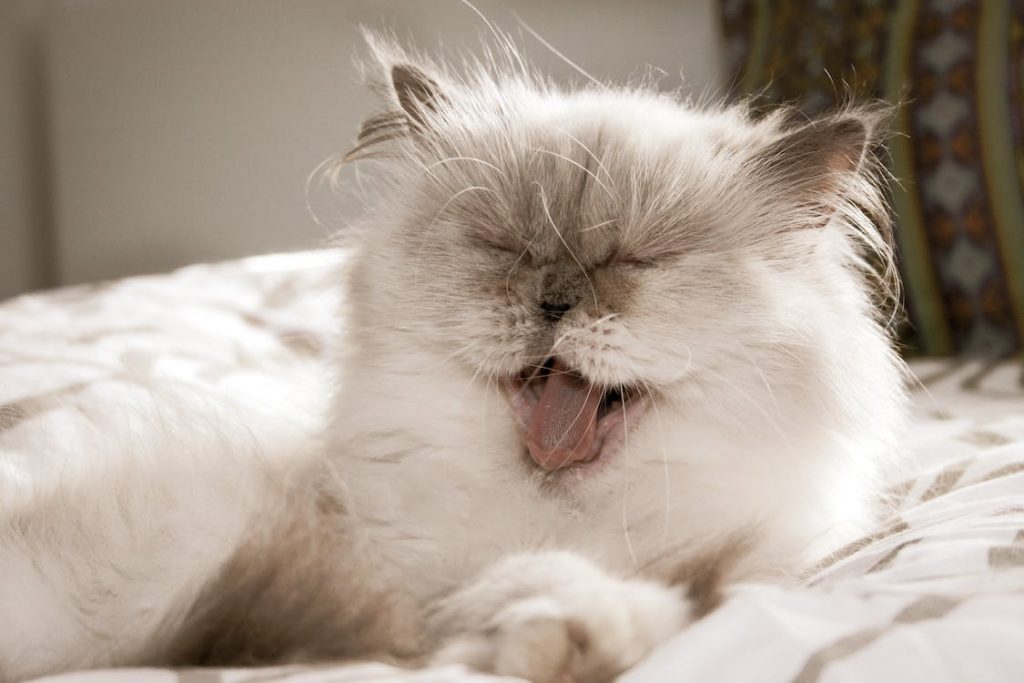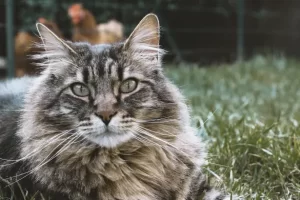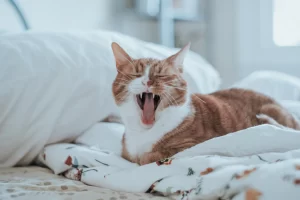Last updated on January 28th, 2023 at 07:26 pm

Do you ever reach down to give your cat a head kiss and instead catch a whiff of their nasty breath? To put it mildly, it’s awkward for both of you. We love kissing our pets, and most of the time, we don’t usually recognize that they have bad breath like some people. However, even if it is rare, it can still happen. That leads to a question most fur parents ask, “why does my cat have bad breath?” To be honest, it can indicate many things, such as eating smelly food or having medical conditions. Don’t worry, we will cover everything in this article.
Cats, like humans, can get insects and other potentially dangerous or frightening objects inside their teeth and gums. If you have ever been ill and lacked a way to freshen your breath, you may understand how terrible it is for cats. Bad breath, also called Halitosis, may be a symptom of illness, and if your cat has one, you should take them to the vet immediately. This is our first tip so you can rule out severe medical conditions that can cause pain to your feline companion. Let’s learn what might cause halitosis in cats and the several medical treatments you can do to fix it.
Why Does My Cat Have Bad Breath?
If your cat has halitosis, also known as bad breath in cats, it’s okay to be worried. Pet owners don’t usually react to cats’ lousy breath until they notice that it is now causing discomfort to both them and their feline companions. This usually happens when fur parents avoid grooming their cats, taking them to the vet, or using essential cleaning tools to remove excess tartar and food residue on their cat’s mouths. Like human teeth, these residues produce bacteria that may lead to a cavity or other severe teeth problems in your cat.
Honestly speaking, bad breath in cats is something you should worry about. If your cat continues to grow the bacteria inside their teeth and gums, it can cause them a lot of pain and become a nightmare for you and your cat. There are some cases where cat owners tend to avoid the bad breath situation of their cat and then later discover that they have severe kidney or heart disease. These circumstances usually happen when the bacteria enters the bloodstream and affects other healthy organs. If you suspect your cat has a foul smell inside their mouth, and even grooming can’t remove it, consult your vet immediately.
As we said, other than lack of grooming and cleaning, there are other reasons your cat has bad breath. Here are some medical reasons why your cat has bad breath and why you should worry about it.
1. Periodontal Disease (Gum Disease)
Gingivitis is one of the most common mouth problems in humans; surprisingly, it may also happen in your cats. It happened when tartar and plaque started to build up in the gums, causing inflammation and pain. If you experience Gingivitis, you’ll know how uncomfortable it is, especially when it keeps you from eating what you like. This mouth infection will destroy healthy tissues in your mouth and start to eat and infect your gums, causing them to bleed, rot, and produce a horrible smell.
If you don’t treat it or administer any antibiotics usually given by vets, it will lead to periodontal disease. With this horrible mouth disease, your cat may lose one of the most important parts of their body, their teeth. It will start to fall off, gums will bleed, and your cat will experience painful symptoms. In medical explanation, it will also start to damage the tissue barrier that can cause endotoxins to start a periodontal deterioration. It can also cause endotoxemia and bacteremia. This can cause uncomfortable pain that may be fatal for our feline companion. Trust me; it’s a horrible experience for your feline companion.
2. Stomatitis
Ever heard of Feline Leukemia Virus? Sounds problematic. This one is linked to that fearful cat disease. Lymphocytic plasmacytic stomatitis is a severe mouth inflammation that causes swollen and bleeding gums. It is excruciating that cats won’t even manage to open their mouths. The best approach is to consult your veterinarian as soon as possible. If your vet diagnoses your cat with stomatitis, your vet will administer antibiotics and pain medications, along with cleaning and possible tooth extraction.
3. Liver Disease
This might be one of the scariest reasons for bad breath. Like in humans, a damaged liver can cause stinky breath for your cats. Simply put, the result is that if your cat’s liver is damaged, you will be forced to tolerate its foul breath. Additionally, you will observe that your cat’s teeth have begun to turn yellow, just as its skin has, the same symptoms as when a human contacts a liver disease.
4. Diabetes
Diabetes is also prevalent in pets. With an irregular diet that contains too much sugar, your cat can easily have diabetes. Like humans, diabetes in cats is characterized by excessive urination, particularly at night, increased thirst, an extreme need to eat, and foul breath. However, diabetic cats’ breath has a lovely fruity aroma. Technically, it’s not bad breath, but still, it should be a concern to pet owners like us as it can be fatal to your pets.
5. Mouth Cancer
Though mouth cancers in cats are uncommon, they can still happen! A lot of factors can affect it, but it can still happen. For instance, a genetic predisposition to mouth malignancies may run in your cat’s family. Some cats get mouth cancer as a result of poor dietary practices.
Regardless of the underlying reason, bad breath is cats’ most visible sign of oral cancer. I know cancer seems a bit absurd, but we shouldn’t rule it out as a possibility. In addition, you may have observed that your furry friend has lost a significant amount of weight and is coughing excessively because tumors cause substantial weight loss. If you suspect this is the case, please consult your veterinarian immediately.
6. Kidney failure
Ever heard of Kidney failure? Pretty sure you have! If your cat is already a senior cat, kidney failure is one of the diseases you should try to avoid at all costs! Kidney disease can show a lot of apparent symptoms. Since we are talking about bad breath, cats with kidney failure usually have bad breath that smells like ammonia. If you are unfamiliar with the smell of ammonia, it usually smells like a fish tank or, most likely, a rotten fish. Cats with kidney failure also experience weight loss, excessive thirst, lack of appetite, frequent urination, and oral inflammation. Don’t worry; it can be managed like kidney disease in people. If your cat exhibits one or two of the symptoms mentioned above, consult your vet immediately and take immediate actions like keeping your cat hydrated.
7. Oral Ulcers
Like mouth cancer, oral ulcer causes a lot of pain for your cats, and surprisingly, poor oral hygiene is frequently the cause of mouth ulcers or cankers. Check your cat’s mouth to see if it has oral redness, inflammation, and pale white or yellow gums. Other symptoms may include a lack of appetite, bad breath, weight loss, and vomiting. If you notice these symptoms, take your cat to the vet immediately. Oral ulcers can be very uncomfortable and painful for your cat.
Like we always say, before administering any home remedies or antibiotics, consult your vet first to rule out any severe medical conditions that can be fatal to your cat.
How to Treat Bad Breaths in Cats?
Now that the possible source of your cat’s bad breath has been explained, we may discuss potential treatments and ways to avoid it. If your cat has bad breath, you can try some of the remedies below.
1. Clean their Teeth
Are you brushing your teeth regularly? If yes, then you should do the same for your cats. Like people, brushing a cat’s teeth can remove excess plaque and tartar that can cause bacteria build-up, which is usually the first step of oral medical problems. You can also ask your groomer to do this if you are uncomfortable. Use toothpaste intended for cats to use as human toothpaste can have ingredients that are harmful and toxic to your cats.
2. Take Note of their Chewing Habits
If your cat has poor breath, it could be due to inappropriate chewing. Numerous dental chews and cat toys marketed at pet stores are safe for cats to chew. You can also use catnip to attract them to chew on appropriate toys. If your cat has the propensity to chew on non-food or non-catnip items, take notes and ask your vet for advice to help stop the behavior.
3. Professional Cleaning Services for Pets
Need more options? Contact your vet and ask if they have any professional teeth cleaning services. It’s the same as dental teeth cleaning in people. Humans can always brush their teeth, but we still need extensive cleaning provided by dentists. That’s common knowledge, right? Veterinarians and professional cleaning services for pets usually have tools to help remove plaques we can’t see. They can help in maintaining your cat’s mouth healthy, as well as keep it smelling fresh all the time. To keep it short and simple, a regular vet and groomer visit can solve many problems.
4. Try to Use Cat Dental Treats
Dental treats are purposely created to help your cat maintain a healthy, good-smelling mouth. To keep you more comfortable in investing in dental treats, it is proven effective in reducing damaging tartars. Some dental treats can be used daily after a cat’s meal, while most of them can be used at least once a week. It’s a bit more expensive than regular cat treats, but hey, our cat is worth the investment, right? You can also consult your vet if you want insurance and tip on where to get a cat dental treat.
Conclusion
It is undeniable that your cat’s breath gives you the creeps. However, being calm is the wisest course of action. True, a cat’s poor breath can indicate a health issue, but don’t worry! Bad breath may sound a bit harsh, and some fur parents may see it as no threat, while others will see it as a concerning issue. Either way, it can be treated with proper medical assistance or even just grooming. You just have to be optimistic.
Visit your vet regularly and maintain your cat’s teeth in good condition to preserve their overall health. Keeping your pet’s mouth minty fresh is easy with specially formulated chow that has been found to minimize plaque and tartar formation significantly. We do hope that it gave you the clarity you need to improve things for you, your cat, and your cat’s teeth and mouth.


